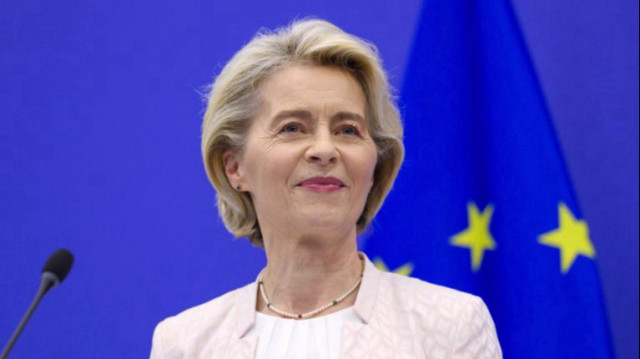
Coming years will be vital well beyond Europe, all continents will have to speed up transition towards net zero, deal with growing burden of climate change,' says von der Leyen
As the Paris climate change agreement continues to be the best hope for all humanity, Europe will remain part of the pact, the European Commission head said Tuesday after US President Donald Trump signed an order withdrawing the US from the accord.
"The coming years will be vital well beyond Europe, all continents will have to speed up the transition towards net zero, and deal with a growing burden of climate change," Ursula von der Leyen, the commission's president, told the World Economic Forum in Davos, Switzerland.
Touching on the impact of climate change from heat waves to floods and wildfires, von der Leyen said climate change is still on top of the global agenda, from decarbonizing to nature-based solutions.
"Europe will stay the course and keep working with all nations that want to protect nature and stop global warning," she added.
Her remarks came hours after Trump's decision to withdraw the US from the landmark accord, whose decisions scientists say are critical for preventing a catastrophic rise in temperatures which imperil the entire planet and all countries, including the US.
- 'New era of harsh geostrategic competition'
In her Davos address, Von der Leyen said that the cooperative international order imagined a generation ago has unfortunately not turned into reality, with the world instead entering a "new era of harsh geostrategic competition."
"The world's major economies are vying for access to raw materials, new technologies and global trade routes. From AI to clean tech, from quantum to space, from the Arctic to the South-China Sea – the race is on."
As this competition intensifies, she said, Europe will likely continue to see "frequent use of economic tools," such as sanctions, export controls, and tariffs, that are intended to safeguard economic and national security.
But von der Leyen stressed that it is important that they balance the imperative to safeguard security against the opportunity to innovate and enhance prosperity.
"The world is changing. So must we," she said, adding that Europe once relied on cheap energy from Russia, before the Ukraine war, and often outsourced its own security, but "those days are gone."
"To sustain our growth in the next quarter of the century, Europe must shift gears," said von der Leyen, saying that is why former European Central Bank President Mario Draghi was tasked to deliver a report on European competitiveness.
- 'We will be pragmatic'
Next week, the European Commission is presenting a roadmap to drive the bloc's work for the next five years.
"The focus will be to increase productivity by closing the innovation gap. A joint plan for decarbonization and competitiveness to overcome skills and labor shortages and cut red tape," said von der Leyen.
Also saying that the European Single Market still has" too many national barriers" that sometimes force companies to deal with 27 sets of national legislation, she said they will instead propose a single set of rules for the entire bloc.
Von der Leyen also said it is time to pursue a "more balanced relationship" with China, in a spirit of fairness and reciprocity, adding that they will be pragmatic with the US under the new Trump administration.
"Our first priority will be to engage early, discuss common interests, and be ready to negotiate,” she said.
"We will be pragmatic, but we will always stand by our principles to protect our interests and uphold our values – that is the European way."
"No other economies in the world are as integrated as we are ... a lot is at stake for both sides," said von der Leyen.
Trump has previously threatened to impose tariffs on European imports and has been largely scornful of traditional US European allies and alliances.
Hello, the comments you share on our site are a valuable resource for other users. Please respect other users and different opinions. Do not use rude, offensive, derogatory, or discriminatory language.
The floor is all yours.








